46% of preadolescent girls had "misaligned" biological sex and gender?
07.10.2025 21:02 — 👍 0 🔁 0 💬 4 📌 0Nicole Petersen
@npetersen.bsky.social
assistant professor @UCLA - neuromodulation, neuroimaging, neuroendocrinology :)
@npetersen.bsky.social
assistant professor @UCLA - neuromodulation, neuroimaging, neuroendocrinology :)
46% of preadolescent girls had "misaligned" biological sex and gender?
07.10.2025 21:02 — 👍 0 🔁 0 💬 4 📌 0
Hormonal milieu influences whole-brain structural dynamics across the menstrual cycle using dense sampling in multiple individuals
@carinaheller.bsky.social, @uni-jena.de,
@umn-midb.bsky.social, @icsantabarbara.bsky.social
www.nature.com/articles/s41...
"no garbage"
I guess this is a different conversation but we are assuming here that score is tightly related to quality. I am less confident of this each time I sit on study section
kind of a bold claim
06.09.2025 17:27 — 👍 1 🔁 0 💬 1 📌 0 27.08.2025 22:33 — 👍 0 🔁 0 💬 1 📌 0
27.08.2025 22:33 — 👍 0 🔁 0 💬 1 📌 0
Factor 3: Expertise and Resources
27.08.2025 22:30 — 👍 0 🔁 0 💬 2 📌 0I just got an "Additional expertise needed" because one consultant is off-site. in the year of our lord 2025. no other comments. :)
27.08.2025 21:53 — 👍 1 🔁 1 💬 1 📌 0the link takes me to the wrong place! do you have another?
27.08.2025 20:44 — 👍 3 🔁 0 💬 1 📌 0
We wrote a piece for @naturemedicine.bsky.social 🧠
Menstrual cycle irregularities can be both cause and consequence of wide-ranging health issues.
Embracing this complexity could reveal novel brain–body interactions and advance neuroscience.
Check out our commentary www.nature.com/articles/s41...
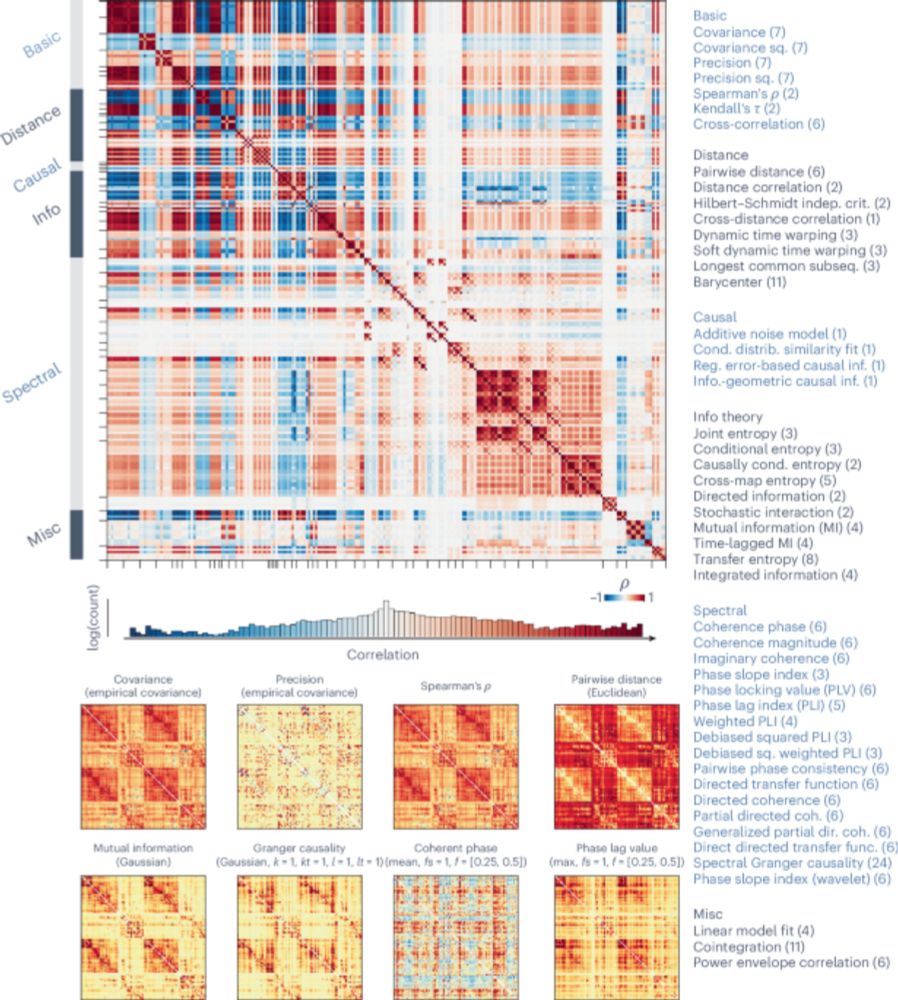
An Analysis of 200 pairwise statistics for functional brain connectivity in tasks such as hub mapping, distance relationships, structure-function coupling and behavior prediction highlights their effectiveness for neurophysiological applications.
www.nature.com/articles/s41...
we are entering a whole new era of brain imaging analytics 🤩🧠
05.06.2025 23:20 — 👍 0 🔁 0 💬 0 📌 0really cool!!! love to see the convergence across PET / genes / fMRI. please please consider making the .niis / statistical maps from figs 3-5 downloadable!! curious to see how closely the activation pattern you report overlaps with other CUD studies 😁
05.06.2025 14:09 — 👍 0 🔁 0 💬 1 📌 0high-dose stimulants lead to psychosis -- basically, if you keep turning up the "salience" volume eventually everything seems salient and the brain scrambles to explain it?
23.05.2025 18:19 — 👍 4 🔁 0 💬 1 📌 0this paper was such a joy to read. in addition to the very thorough treatment of the data I love how densely-referenced the intro is; I think I learned something from every sentence! one passing thought about the salience boost -- I wonder if that's the mechanism by which (cont)
23.05.2025 18:19 — 👍 5 🔁 0 💬 1 📌 0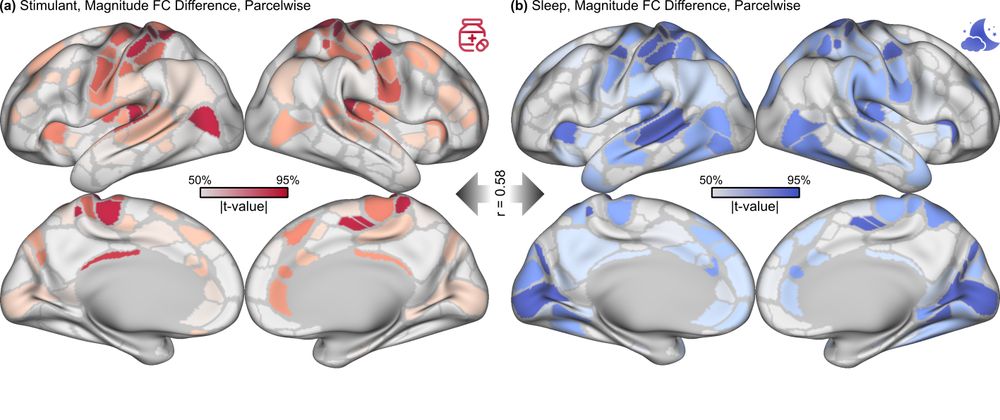
My med school textbook says stimulants like Ritalin treat hyperactivity by “stimulating” the brain’s attention and cognitive control systems. We studied children taking stimulants in the ABCD Study, and the largest differences were actually in arousal and reward networks! Check out our preprint!
22.05.2025 21:33 — 👍 146 🔁 55 💬 11 📌 10I'm curious if some journals are already implementing this. I have 1 paper under re-review and got 3 reviews. R3 was clearly written by AI, but I assumed someone got invited to review and used AI. I checked the researchsquare timeline and only 2 reviewers ever agreed.
17.05.2025 20:21 — 👍 2 🔁 0 💬 0 📌 0thank you, I just dipped my toe in (louvain) and will be taking it back out. sbm = stochastic block model?
01.04.2025 17:53 — 👍 2 🔁 0 💬 1 📌 0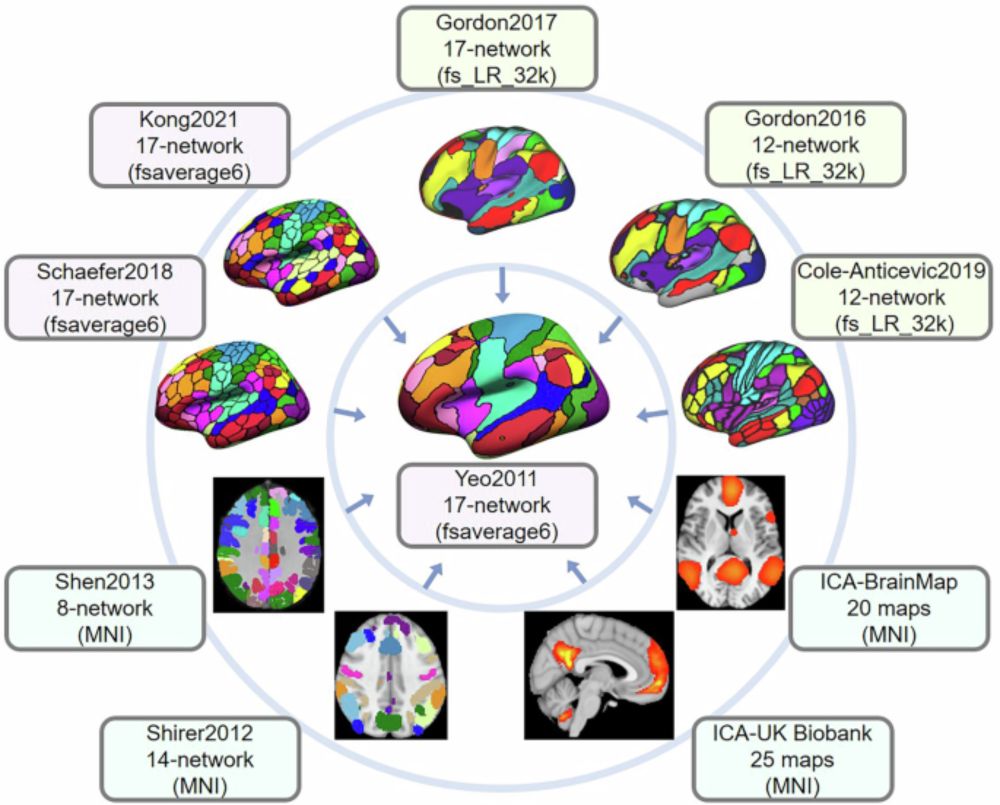
It's finally here! Use the Network Correspondence Toolbox to help contextualize your neuroimaging findings 🧠
26.03.2025 01:54 — 👍 181 🔁 85 💬 11 📌 2
super cool -- thought this might be of interest if you hadn't seen it already: elifesciences.org/articles/71846
27.03.2025 16:10 — 👍 1 🔁 0 💬 1 📌 0thank you!! reassuring that this is business as usual!
03.03.2025 20:19 — 👍 1 🔁 0 💬 0 📌 0Congrats, very cool finding and wow, what an effort!! I bet we could use tms + fmri to test this circuit in humans 🧐
20.02.2025 00:15 — 👍 3 🔁 0 💬 1 📌 0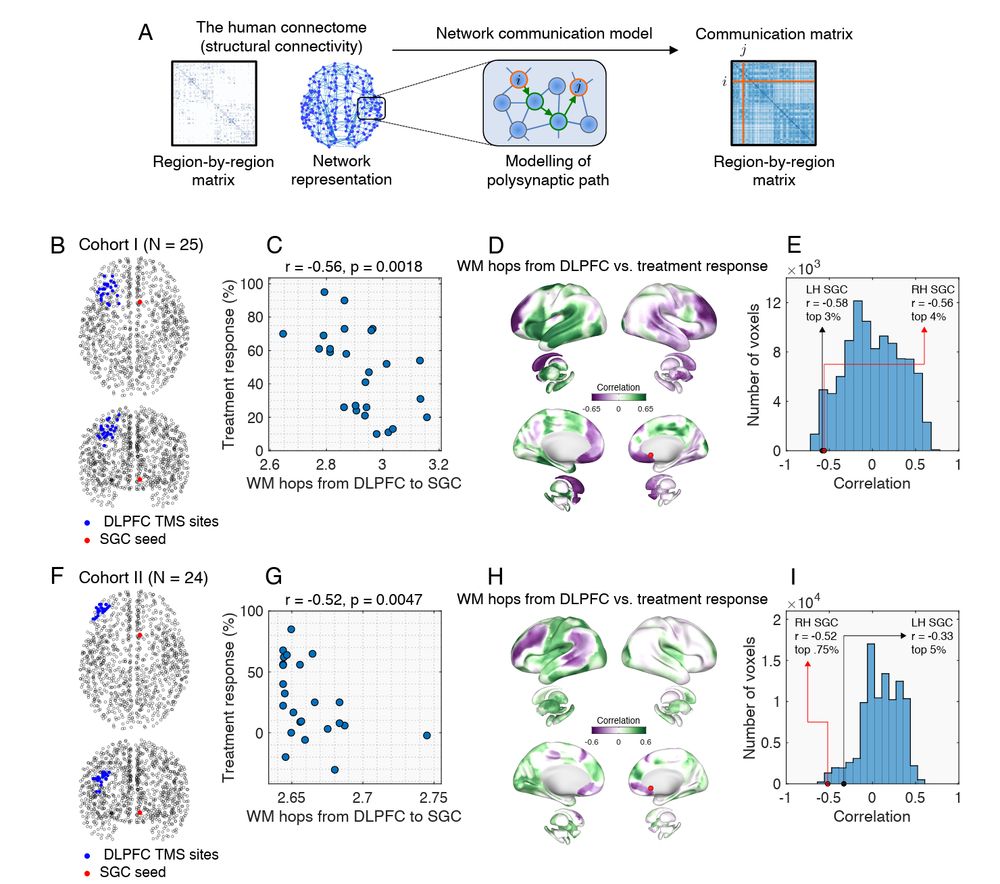
Caio is having a good day. Another preprint on which he's first author -- this time, describing pathways through the connectome for indirectly stimulating subgenual cingulate cortex in the context of depression.
Neuroanatomical pathways of TMS therapy for depression
www.medrxiv.org/content/10.1...
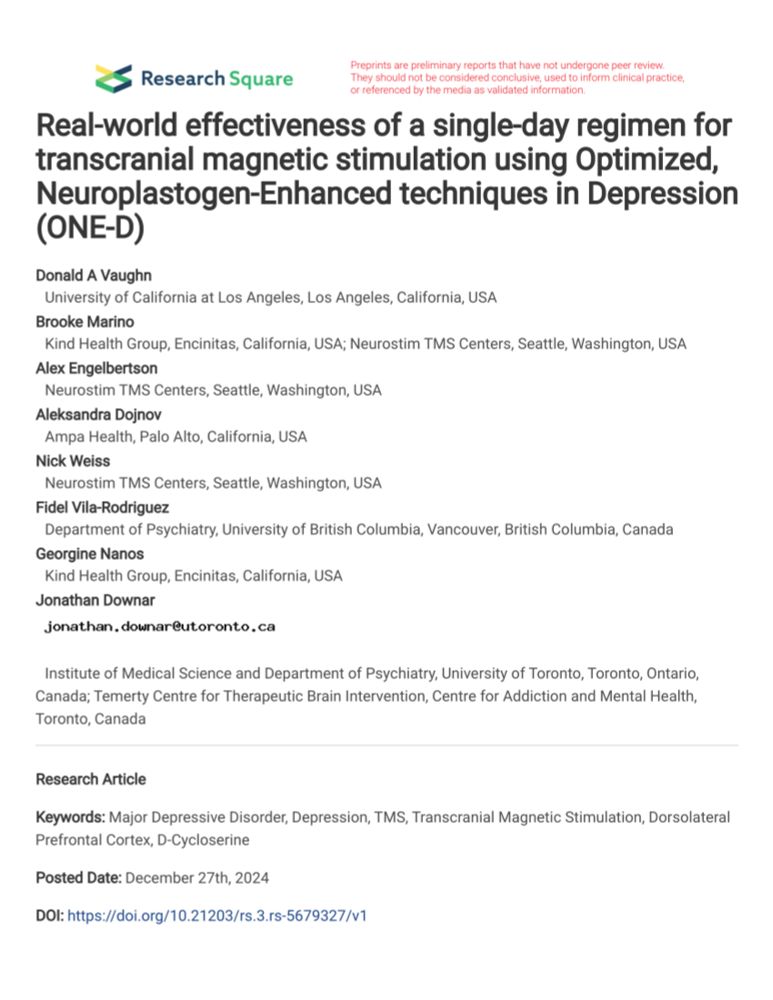
New landmark TMS trial dropped by Jonathan Downar's team, which will revolutionize care for depression even more than the SAINT trial did – extensive (10 hour!) sessions of TMS in a single day, enhanced by single dose of cycloserine. 90% response, 70% remission!
www.researchgate.net/publication/...
I guess I'm a little surprised by the intransigence of journals. on social media, we are all! about! high! rigor! studies! null and "boring" results are welcome as long as the study was conducted well! but those same studies get desk rejected from "high impact" journals every day.
15.12.2024 18:55 — 👍 1 🔁 0 💬 1 📌 0this is the content I'm here for! when you're ~15ish applications into that streak it's hard to know if you should keep going or jump ship.
06.12.2024 02:11 — 👍 5 🔁 0 💬 2 📌 02/2
The second is my solution for the replication crisis. It was recently accepted at Assessment.
"How to Produce, Identify, and Motivate Robust Psychological Science: A Roadmap and a Response to Vize et al."
doi.org/10.31234/osf...
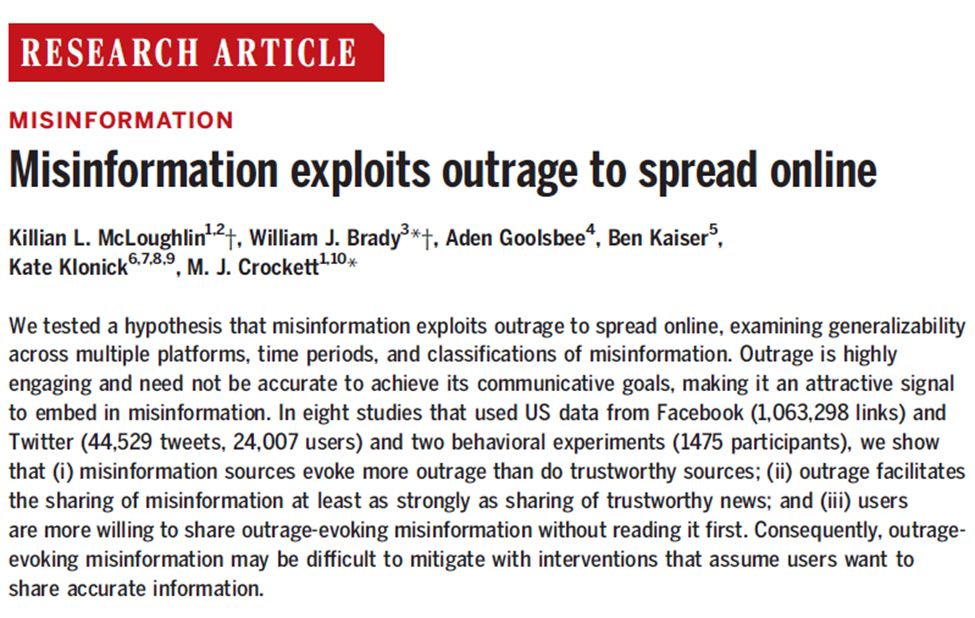
New paper out in @ScienceMagazine! In 8 studies (multiple platforms, methods, time periods) we find: misinformation evokes more outrage than trustworthy news, when it does it's shared more + ppl are less likely to read before sharing. w/ @killianmcl1 @Klonick @mollycrockett 🧵👇
28.11.2024 19:06 — 👍 3561 🔁 1166 💬 128 📌 139sure, everyone agrees on that. easier said than done! and blaming right wing mis/disinformation overlooks that scientists have -- without those bad actors -- burned a lot of credibility via genuine bad behavior. not all scientific mistrust is misplaced, and that's a different kind of problem
30.11.2024 03:49 — 👍 1 🔁 0 💬 0 📌 0not just transparency. rigor + transparency
29.11.2024 21:31 — 👍 4 🔁 0 💬 2 📌 0